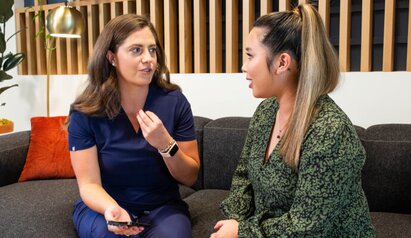Speech Therapy Techniques for Stuttering


Published December 18, 2019

Becoming a speech-language pathologist was a no-brainer for me. I knew that I wanted to do clinical work that had a transformative impact on others. For many years I worked weekends and holidays, giving everything to my professional growth. However, as life and priorities change, and our family grew to 6, I needed more flexibility with my career.
What I didn’t know was that I could have both.
Early in my career, I worked in a demanding outpatient facility treating patients who had suffered a neurological event. This required working with clinicians across various different specialties to provide well-rounded care. Collaboration in the hospital and outpatient setting helped shape the way I work today. Working with other health professionals opened a new world of possibilities in the field of speech-language pathology. And as it happens, I was about to stumble upon a new and exciting opportunity.
I was first introduced to oral myofunctional therapy (OMT) by an orthodontist in my hometown. This therapy addresses the impact of the lips, tongue, palate, and other oral structures on functions of the face and mouth. Facial exercises and behavior modifications are used to re-pattern the oral muscles and improve critical functions such as swallowing, chewing, eating, talking, and breathing.
This is when I had a breakthrough idea: I would treat them. The orthodontist agreed to refer all patients suffering from oral myofunctional disorders to me. It wasn’t long before OMT became the on-ramp to starting my private practice and the beginning of a new chapter in my career.
The orthodontist explained that whenever he came across patients with obvious swallowing disorders, he would refer them to their school speech-therapist for myofunctional therapy. I knew this wasn’t optimal for his patients. Many children don’t qualify for speech services in school, and school-based speech programs likely don’t have the necessary resources for identifying and treating underlying myofunctional issues.
This is when I had a breakthrough idea: I would treat them. The orthodontist agreed to refer all patients suffering from oral myofunctional disorders to me. It wasn’t long before OMT became the on-ramp to starting my private practice and the beginning of a new chapter in my career.
When my OMT training came to a close, I undoubtedly knew that it was the right path for my career. I also realized that there was so much more to be done to expand the field by empowering SLPs to learn about OMT and start their own businesses.
After my training, I opened Simon Says and quickly implemented the new OMT techniques I learned. Once I was comfortable in my new practice, I started drafting my own OMT materials using new techniques specific to the speech-language pathology approach. As a result, my practice thrived.
I started drafting my own OMT materials using new techniques specific to the speech-language pathology approach. As a result, my practice thrived.
To grow my client list, I fell back on my network of local health professionals and worked to establish new relationships. This helped to shape the interdisciplinary approach to treatment I promote today. Working in the niche market of myofunctional therapy quickly became incredibly fun and fulfilling. I viewed my positive experience and rapid growth as an opportunity to reach out to other entrepreneurial SLPs.
The roles I assumed next in my journey were that of teacher and mentor. My husband encouraged me to turn my enthusiasm for OMT into a platform to support other SLPs looking for direction in their careers.
I’m happy to say that, after a couple years into this venture, there is nothing more gratifying than spending a weekend workshopping with SLPs. We share ideas, review clinical outcomes, and challenge ourselves to grow as professionals. Through OMT, I’ve been granted the flexibility and independence to launch my own business and I’m lucky to be able to share the field with other speech-language professionals.
In 2017, Simon Says started offering OMT training exclusively for SLPs. The Simon Says program not only teaches SLPs how to implement OMT techniques, it also fosters a community that students can leverage to grow their own businesses.
In 2017, Simon Says started offering OMT training exclusively for SLPs. The Simon Says program not only teaches SLPs how to implement OMT techniques, it also fosters a community that students can leverage to grow their own businesses.
I now offer live trainings, OMT program materials, business development information, and other resources for SLPs through Simon Says. If you’re looking to expand your skill set as an SLP, it’s easy to attend in-person workshops or online sessions.
I knew I wanted to be a speech-language pathologist, but it wasn’t until I found my niche that I started to thrive in my career. It made my work more fulfilling and helped me expand my client base. I’ve been able to build a successful business from the ground up.
You don’t have to be an SLP to benefit from my story. Every health professional should take the time to ask themselves these important questions:
When I figured out the answers to these questions, my career path became clear. My business quickly expanded and I started providing additional services, like professional training and business development guides. Along the way, SimplePractice helped me to manage my practice effectively so I could continue to grow as a health professional and explore more possibilities in the OMT community.
We’re always creating tools and resources for our community. If you found this article useful, here are more blog posts you may like:
• [FREE DOWNLOAD] Letter Templates for SLPs
• How to Choose the Best EHR for Your Private SLP Practice

Starting in 2009, Jennifer attended multiple myofunctional therapy training seminars and ultimately developed her own OMT programs made with speech therapists in mind. She travels around the country teaching other SLP's about Myofunctional disorders and how to implement or start their own practice in OMT.
Proudly made in Santa Monica, CA © 2025 SimplePractice, LLC
Proudly made in Santa Monica, CA © 2025
SimplePractice, LLC